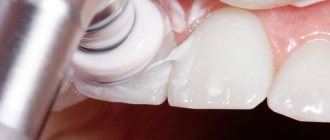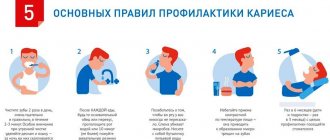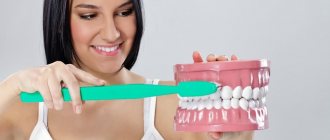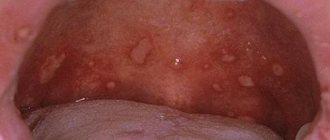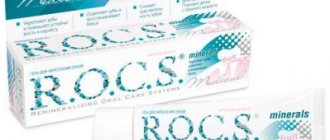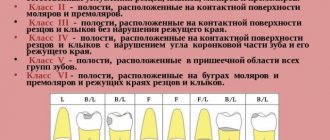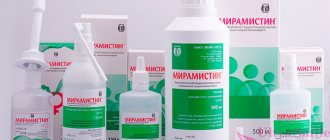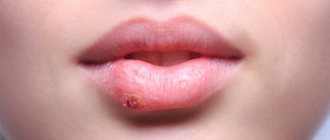Author of the article:
Soldatova Lyudmila Nikolaevna
Candidate of Medical Sciences, Professor of the Department of Clinical Dentistry of the St. Petersburg Medical and Social Institute, Chief Physician of the Alfa-Dent Dental Clinic, St. Petersburg
The human oral cavity is often called a mirror of the state of the body. A qualified dentist, after performing a visual examination of the oral mucosa and teeth, can determine what chronic diseases the patient has and advise him to see a specific doctor. Thus, diseases of the endocrine or nervous system, gastrointestinal tract or blood diseases can be diagnosed using the oral cavity.
At the same time, if there are chronic diseases in the oral cavity, then they, in turn, can become a provoking factor for the development of rheumatism, pyelonephritis and some other diseases. Remember how, for example, pregnant women before giving birth and patients before a planned operation need to obtain a certificate of oral sanitation. Therefore, prevention is very important for everyone. Moreover, we are talking not only about a beautiful and healthy smile, but also about health in general, and also, of course, about those funds from the family budget that will have to be spent on treatment at the dentist.
Prevention of oral diseases
When they talk about the prevention of oral diseases, they primarily mean:
- Self-regular oral care.
- Periodic visits to the dental clinic.
Why do you need to take care of your mouth? The fact is that after each meal, food particles remain on the teeth and mucous membranes of the mouth, as a result, upon contact with saliva, bacteria and microbes begin to multiply in the mouth, which ultimately leads to the appearance of caries, bad breath, plaque and dental plaque. stone
Some people, unfortunately, do not understand the importance of this procedure, erroneously claiming that animals don’t brush their teeth or anything. But we must not forget that animals live much shorter lives, and, most importantly, they monitor their diet, consuming sufficient quantities of food of plant origin.
Eating habits
The condition of our teeth largely depends on what we eat. It is recommended to minimize the intake of fast carbohydrates (various sweets, flour, carbonated sweet water, etc.). It is necessary to saturate the diet with fermented milk products, fresh fruits and vegetables. It is important that the body does not experience a deficiency of vitamins or microelements.
Important! Food that is too cold or hot is extremely harmful to teeth; this can lead to increased sensitivity of the enamel.
Brushing your teeth with a toothbrush
The most important thing in preventing oral diseases is brushing your teeth. Every person, regardless of age, including children, should brush their teeth morning and evening. Moreover, observing certain rules.
- You need to brush your teeth for at least five minutes.
- Brush your teeth with rotational movements, otherwise, if you brush straight, the plaque will simply be driven into the gum pockets and between the teeth.
- Do not press the brush too hard to avoid damaging the enamel.
- When brushing your teeth, mentally divide all your teeth into four sections and brush each one separately so as not to spread germs throughout the jaw.
- You need to brush not only the teeth from above, but also near the gums, at the base, and also the gums themselves.
- Dentists recommend placing the brush at an angle of 45 degrees when brushing your teeth.
- First you need to brush the far teeth of the upper jaw, then the front teeth, turning the brush vertically, and then start cleaning the teeth of the lower jaw. Finish brushing your teeth by massaging your gums and brushing your tongue.
- In this case, you should take no more than a pea-sized amount of toothpaste.
Panoramic shot
A dental panoramic photograph is a circular digital image of the entire jaw in a two-dimensional plane.
This examination allows you to:
- identify hidden caries;
- diagnose the condition of teeth under crowns and fillings;
- assess the health of canals and root tips;
- determine the presence of permanent tooth buds in children;
- establish periodontitis disease;
- monitor the condition of teeth during implantation and prosthetics.
An orthopantomogram, like a dental photograph, significantly increases the capabilities of dentists and allows them to see what cannot be detected during a visual examination.
How to choose the right toothbrush
Just as important as brushing your teeth is choosing a good toothbrush. Experts advise purchasing a brush with artificial bristles, which is considered more hygienic, practical and durable. As for the optimal degree of hardness, if the patient does not have any special indications, a regular brush of medium hardness will suit him.
It is also worth paying attention to the size of the toothbrush - optimally it should cover three teeth.
We must not forget that the brush needs to be changed periodically. It’s difficult to say how often to do this, because for some the brush can wear out in a month, while for others it can last two to three months. This depends on many factors, in particular, how often you brush your teeth, with what force you do it, how long the procedure lasts, and what toothpaste you use.
Therefore, some dentists advise purchasing toothbrushes with colored tufts of bristles, which are indicators. On a new brush they are always bright, and when the bristles wear out, they take on a pale blue tint. Noticed this on your toothbrush? It's time to go to the pharmacy for a new one.
If your brush does not have such indicators, simply change it at least once a quarter.
Recently, electric toothbrushes have become popular, although the attitude towards them from professional dentists is rather ambiguous. Therefore, before purchasing such a modern brush, it is better to consult your doctor.
Battery-powered teeth polishing devices are also available on the market. According to dentists, they can be used, but not often, as they can damage the enamel.
Dental X-ray
A dental x-ray allows you to obtain detailed information about the condition of your teeth and see them completely from root to crown.
Such a picture is necessary to determine:
- depth and magnitude of carious processes;
- condition of the roots and adjacent tissues;
- periodontitis;
- periodontitis;
- location of teeth in the jawbone;
- presence of abnormalities and neoplasms;
- inflammatory processes under fillings;
- possible destruction under artificial crowns;
- complications associated with wisdom teeth, etc.
Toothbrush care
There are also rules on how to care for your toothbrush so that it helps maintain oral health and does not harm your teeth and gums. What is needed for this?
- Never give your own toothbrush or borrow someone else’s toothbrush, even from your own family members.
- After each brushing procedure, the brush should be washed with soap. You can use it next time only when it is completely dry.
- It is advisable for each person to have two brushes: one for use at home, the second “travel brush” to take with you on trips.
- To clean the brush from germs, you can use various antiseptics or rinses.
- Each brush should be dried in a cup separately from the others, without touching them. Ideally, you can use a “cap” or case for each brush.
Preventive dental procedures
At your dentist’s appointment, you can perform several preventive procedures that will protect your teeth from various diseases:
|
How to choose toothpaste
When choosing a toothpaste, it is a good idea to consult your doctor. Do not get carried away with abrasive toothpastes: it is better to alternate them with regular ones. For children, you should buy special children's pastes, according to their age. For people with sensitive gums and teeth - professional pastes.
In general, all toothpastes that are available in pharmacies today can be divided into:
- hygienic, which are suitable for everyone, as they do not contain special medicinal components;
- therapeutic and prophylactic: they can also be used daily as a prophylactic against various diseases;
- medicinal: they should be used only as prescribed by a doctor.
If for some reason a person does not like toothpastes, then he can use special dental gels to clean his teeth. However, we must not forget that in terms of their abrasive properties they are significantly inferior to pastes.
And during the day, when it is not possible to use toothpaste, or after morning or evening brushing, you can use dental elixirs.
We recommend Asepta toothpastes. They are designed to meet all oral hygiene requirements. The components they contain effectively clean teeth, strengthen enamel, prevent the occurrence of caries, and gently freshen breath.
Prevention of caries
This pathological process of changes in enamel and hard tissues affects up to 98% of the entire population of the planet, so the relevance of preventive procedures for this disease does not need to be confirmed.
Measures to prevent the occurrence and development of caries:
- It is important to monitor your diet: protein foods, foods that contain large amounts of amino acids, trace elements and vitamins (especially calcium and phosphorus), are an excellent non-drug method for preventing caries.
- At the same time, you should limit your carbohydrate intake, give preference to sweeteners, and avoid drinking too hot or too cold drinks.
- Regular and thorough oral hygiene, which is accompanied by the use of toothpastes that have a therapeutic and prophylactic effect.
- The use of various kinds of complexes of vitamins, macro- and microelements, which the body (especially a growing one) needs most.
- Applications, rinses, baths, electrophoresis, which are carried out by various remineralizing agents.
Clinical researches
ASEPTA toothpastes are clinically proven effective. For example, repeated clinical studies have proven that regular use of preventive toothpaste ASEPTA SENSITIVE for a month can reduce bleeding gums by 62%, reduce the sensitivity of teeth and gums by 48% and reduce inflammation by 66%.
In addition, it was proven that regular use of professional toothpaste ASEPTA COFFEE AND TOBACCO for a month improved the hydration of the mucous membrane by 3.3 times, the remineralizing efficiency increased by 3.9 times, at the same time, the cleansing effect has increasing dynamics and reaches 60.5% at 4 weeks of use.
Sources:
- Clinical studies of antisensitive toothpaste “Asepta Sensitive” (A.A. Leontyev, O.V. Kalinina, S.B. Ulitovsky) A.A. LEONTIEV, dentist O.V. KALININA, dentist S.B. ULITOVSKY, Doctor of Medical Sciences, Prof. Department of Therapeutic Dentistry, St. Petersburg State Medical University named after. acad. I.P. Pavlova
- Report on determining/confirming the preventive properties of toothpaste “ASEPTA PLUS” COFFEE and TOBACCO Author: doctor-researcher A.A. Leontyev, head Department of Preventive Dentistry, Doctor of Medical Sciences, Professor S.B. Ulitovsky. First St. Petersburg State Medical University named after. acad. I.P. Pavlova, Department of Preventive Dentistry
- Report on determining/confirming the preventive properties of toothpaste “ASEPTA PLUS” GENTLE WHITENING” Author: doctor-researcher A.A. Leontyev, head Department of Preventive Dentistry, Doctor of Medical Sciences, Professor S.B. Ulitovsky First St. Petersburg State Medical University named after. acad. I.P. Pavlova, Department of Preventive Dentistry
Dentistry in Ivanteevka will cure everyone’s teeth
Dental clinic "Sanident" is one of the leading ones in Ivanteyevka. We provide services for the treatment of dental diseases of various forms. Our specialists use only the latest European equipment, high-quality materials and reliable tools. We employ highly qualified doctors who constantly improve their knowledge and are able to solve any problem related to dental health. We provide high-quality treatment of caries, prosthetics, installation of implants, whitening and much more. With us you will get a truly healthy and radiant smile.
Complex dentistry "Sanident" is located at the following addresses:
- Ivanteevka, st. Novoselki, 4 (Ivanteevka railway station);
- Shchelkovo, st. Central, 80 (railway station Voronok).
Periodontal diseases.
A healthy periodontium - a multicomponent complex of tissues surrounding the tooth - ensures complex processes of restructuring the root tissues of temporary and permanent teeth, prevents tooth dislocation during biting and chewing food and in other situations, distributes the load and prevents the tooth from being driven into the bone, and also serves as protection for the internal environment body from the aggressive environment of the oral cavity.
In the depths of a thick layer of dental deposits, i.e. With poor oral hygiene, anaerobic periodontopathogenic microorganisms actively develop - Neisseria, Bacteroides, Prevotella, Actinobacillus and others.
Feeding mainly on proteins, releasing proteolytic enzymes and toxic metabolic products, they attack the epithelium and cause an inflammatory reaction of the gums (swelling, bleeding, pain), i.e. gingivitis. With high aggressiveness of the microflora and/or in the absence of proper protection and tissue regeneration, microorganisms destroy not only epithelial, but also connective tissue (ligaments, bone), move along the tooth root, depriving it of its connection with the bone, as a result of which the teeth become increasingly mobile - those. periodontitis develops.
Dental prevention in children
Healthy teeth are an integral part of a child’s carefree childhood. Proper care, absence of caries and other diseases guarantees oral health. Therefore, it is necessary to carry out timely dental prophylaxis in children.
What can happen to children's teeth?
Children can be classified as a special group of patients. In pediatric dentistry they are always at risk. After all, their body is just learning to work. All protective mechanisms are not yet perfect, and the immune system reacts quite violently to aggressive external influences.
The following factors will contribute to the even greater development of caries, as well as its spread and complications: thin enamel, imperfect immunity, only partial mineralization of teeth, and the anatomical and physiological characteristics of the child.
Caries is one of the sources of chronic infections. It can be the cause of many somatic pathologies. Such as diseases of the gastrointestinal tract, kidney diseases, etc. And caries can also cause complications and even threaten the health of children, not to mention various malocclusion pathologies.
Malocclusion can cause children to become isolated in society, withdrawn, and perform poorly at school. Everything in our body is certainly interconnected. Therefore, it is important to start oral hygiene in children on time and visit the dentist on time.
Caries and malocclusion are some of the consequences of poor dental care
It is possible to prevent caries in a child already during pregnancy and breastfeeding.
At the planning stage of pregnancy, a woman needs to ensure that her body is filled with the necessary vitamins and microelements for the full development of the child. Carry out a complete sanitation of the oral cavity, because caries is a breeding ground for infections, and the formation of organs, including teeth, occurs already in the seventh week of pregnancy. And already at the end of the first half, the baby’s teeth begin to materialize.
Doctors also recommend taking tablets that contain only 1 mg of fluoride. This allows you to achieve two effects at once: the fetus develops strong teeth, and the woman does not wash out fluoride from the body, which ensures that health is maintained at the proper level. Also, do not forget about calcium, which both the unborn child and the mother herself need.
Another important factor in the formation of healthy teeth in a baby is the mother’s regular visits to the dental office. The child takes all the missing “building materials” for his body from the woman’s reserves. And this, in turn, can lead to a lack of vitamins and microelements, and therefore can cause caries, its complications and other diseases of the oral cavity.
A balanced diet will help stop the occurrence of caries and other diseases.
When preventing caries of primary teeth in children, it is important to provide adequate nutrition. Your child's diet should include calcium from dairy products. For better absorption of calcium, vitamin D is also necessary, which can be obtained from fish or exposure to sunlight. Therefore, take your child for walks in the fresh air more often - this helps strengthen the child’s teeth and immunity.
As your child grows, adjust his diet. Dentists recommend excluding some dishes altogether, while adding others, on the contrary. Here are some foods that are considered harmful not only to a child’s teeth, but also to an adult’s:
- Any chocolate products;
- sweets, pastries and cakes;
- fruits with high acidity;
- sweet carbonated drinks;
- concentrated juices, as well as homemade compote, due to their high sugar content.
These products also harm the gastrointestinal tract, causing an imbalance in the acid-base balance. But they can be replaced with more useful ones to avoid dental problems:
- Green tea. It contains natural antioxidants, which slows down the process of caries formation;
- lime. Even though it's citrus. It is rich in fluoride and calcium;
- carrot. This vegetable is rich in vitamins, and its dense structure allows you to cleanse your teeth of plaque.
Dentists also have their own opinion about snacks between main meals. They carry a fairly large factor in the development of caries in children, because they do not allow the acid balance to be restored. Therefore, give preference to solid foods such as apples, carrots, and pears. They do the best job of removing plaque that forms on teeth throughout the day.
It is necessary to practice oral hygiene when a child’s first tooth appears.
It is advisable for the baby to wipe his teeth with a soft cloth or gauze after eating and before going to bed in the direction: from the edge of the gums to the surface of the teeth. As the child gets used to this procedure, a toothbrush with soft bristles and a small head should be used. To prevent baby teeth, it is also recommended to use special wipes with xylitol, which provide protection against microbes.
Dentists also recommend using toothpastes containing fluoride. Such pastes are especially necessary for children with an increased risk of caries. Until the age of 12, parents must supervise the cleaning process. You should not allow your child to swallow fluoride toothpaste. As your baby gets older, you can choose toothpaste with a higher concentration of fluoride.
Always pay attention to the composition of the toothpaste, its quality and purpose. Give preference to those that contain calcium, fluorine, phosphorus to strengthen the enamel, and also correspond to the child’s age.
The next step on the path to healthy teeth is brushing.
It is very important to instill in your child the habit of brushing their teeth every day. This way he realizes the importance of hygiene much earlier. And he will learn to take responsibility for his dental health.
To make the brushing process enjoyable, you need to choose the right toothbrush. At a young age, it is better to give preference to soft bristles so as not to damage the delicate mucous membrane of the gums. They are usually sold in stores labeled “soft”. As you get older, you can switch to medium-hard toothbrushes. They will provide a more thorough cleaning of plaque. Brushes are labeled “medium”.
Only with the help of toothpaste and a brush can you achieve almost complete cleansing of stuck food and plaque. But there is one more important point! Brushes need to be changed promptly, approximately once every three months. With prolonged use, bacteria remain and multiply on the bristles, making the cleaning process less effective.
Take your child to the dental office at least three times a year.
Prevention in pediatric dentistry is not complete without an experienced specialist. Therefore, make it a rule to see a dentist. Only through a professional examination can the development of caries and other oral diseases be detected and prevented in the early stages. If your child does develop early caries, he will promptly carry out all the necessary tests and prescribe treatment. Most often, the following procedures are recommended for children.
- Fluoridation
The doctor coats the child’s teeth with a special innovative composition. It saturates the enamel with all the necessary microelements. Thanks to this procedure, the teeth will become more resistant to aggressive external influences.
- Fissure sealing
This method of treatment and prevention is done both for preschool children with baby teeth and for teenagers. It is advisable to do this procedure within a month or a month and a half from the moment the first molars appear. The doctor closes the deep grooves on the chewing surface of the tooth. Thus, it is possible to eliminate the accumulation of pathogenic bacteria in hard-to-reach places. To do this, experts use fluoropolymer sealant that is resistant to saliva, liquids and acids.
Fissure sealing is one of the necessary methods of prevention
At the first stage, the dentist thoroughly cleans the teeth using a professional brush and toothpaste. Then he applies an acidic substance to the grooves of the pits that have formed on the surface of the tooth. After this, a sealant is applied to the tooth, which is distributed by flowing into the micropores of the enamel and hardens firmly under the influence of a special lamp. This sealant not only “seals” the tooth, but also saturates its enamel with magnesium, calcium and fluoride.
As a result of this procedure, after eating, plaque and bacteria will not accumulate on the chewing surface, which destroy the child’s healthy enamel.
Pharmacy medications will also help improve dental health.
Our diet does not always have enough necessary substances and minerals. Therefore, in pediatric dentistry, doctors recommend receiving all the necessary vitamins in concentrated and dosed form. Today on the shelves of pharmacies you can find many different mineral complexes and vitamins. They are divided into different categories: according to composition, age, indication for use, etc.
To maintain dental health, dentists recommend choosing vitamins with high concentrations of calcium, phosphorus and fluorides. Be sure to consult your doctor before purchasing and using any vitamin complex.
Proper brushing techniques will help keep your teeth healthy.
Brushing teeth for children is not much different from for adults. When cleaning the inner and outer surfaces of teeth, the brush should be positioned at an angle of 45 degrees to the tooth. Perform sweeping movements from the gum to the edge of the tooth. This will thoroughly clean the oral cavity of food debris and plaque. Then, when brushing the chewing surface, position the toothbrush horizontally and move it in a circular motion across the entire dentition, top and bottom.
If you are still not sure how to brush your teeth properly, watch instructional videos. This will make the task much easier.
Brushing children's baby teeth for 2-3 minutes is sufficient. However, this is the norm for an adult. So please be patient while cleaning. If it is difficult for your child to withstand such a procedure, try to turn cleaning into a game, because simple persuasion, as practice shows, does not always help.
Already during the first brushing of teeth, tell your child how useful this procedure is for him. If the child’s fear and reluctance do not go away, then you can watch special educational and preventive pictures that are specially created for children. The sooner you start brushing your teeth with your child, the sooner he will begin to do it on his own. And even more quickly brushing teeth will become a daily habit.
Don’t forget about general hygiene procedures.
High-quality cleaning of the tooth surface and interdental space is unthinkable without additional hygiene, which you need to know about. To do this you need:
- After every meal, rinse your mouth. It is advisable to use special antiseptic solutions for this, which can be found in any pharmacy, or products containing useful microelements. But if for some reason it is not possible to use such products, then ordinary water will do;
- use floss and dental floss. They help clean the spaces between teeth more thoroughly. Such threads are round and flat. It is advisable for children to choose flat flosses in order to avoid wounds on the gums. It is necessary to floss in the presence of an adult, otherwise the child may harm his teeth;
- buy an irrigator. This device is designed for high-quality teeth cleaning at a professional level. Doctors use this not only in pediatric dentistry, but also in adult dentistry. But you can also use it at home if you familiarize yourself with its effects in advance. Here is the main purpose of the irrigator:
- It provides the most effective oral hygiene at home;
- helps prevent the development of other diseases such as periodontitis and gingivitis;
- Suitable for cleaning not only the surface of teeth, but also various artificial structures. It is especially recommended to use this cleaning method when your child has braces or platins;
- prevents the active proliferation of bacteria, and as a result stops carious formations;
- increases blood microcirculation in the gums. The principle of operation of the irrigator is similar to therapeutic massage;
- has a positive effect on the proper functioning of the salivary glands, which again has a beneficial effect on the condition and health of the oral cavity.
Remember that the best treatment in childhood is prevention.
Periodontitis is the leading cause of tooth loss in adulthood
In most cases, periodontal health can be ensured by daily thorough mechanical removal of dental plaque using a brush, paste and dental floss. The appearance of the first, reversible signs of pathology (bleeding when brushing teeth) is by no means a reason to switch to a gentle regime, but, on the contrary, a signal about the need to develop effective methods of cleaning teeth and periodontal space. The dentist can provide significant assistance to the periodontist not only by hygienic training, but also by eliminating local conditions in the oral cavity that reduce the protective capabilities of the periodontium and/or complicate the removal of dental plaque: we are talking about carious tooth decay, poor dental restorations and dentures, malocclusion pathology, unfavorable features architectonics of soft tissues of the oral cavity.
Thus, modern dentistry considers most cases of oral pathology as a consequence of an unhealthy lifestyle. Every doctor should remember the fundamental possibilities for preventing dental diseases and create in patients a sense of responsibility for maintaining health, leaving the choice of individual preventive recommendations and training in specific self-help technologies to the dentist.
HEALTHY TEETH IS THE KEY TO HEALTH
Oral health plays an important role in maintaining the health of the entire body.
The most common dental diseases are dental caries and periodontal disease. They do not pose a threat to life, but their treatment requires large economic costs. The disease most often begins in childhood, progresses steadily and eventually leads to irreversible dental damage, pain and discomfort. If the process is not stopped, the tooth gradually collapses.
The main cause of these diseases is dental plaque - a specific formation on the surface of the tooth caused by the accumulation and growth of microorganisms. Plaque is attached to the surface of the tooth and cannot be washed off with water.
Plaque bacteria convert sugar and food debris in the mouth into acids, which dissolve tooth enamel, resulting in the formation of a cavity. In addition, toxic substances released by bacteria cause gum inflammation (gingivitis) and bleeding. The inflammatory process can spread to the jaw bones and the ligament that holds the teeth in the tooth socket; they lose their stability and become mobile.
Primary prevention of dental diseases is based on the combined use of the following 3 methods: oral hygiene, use of fluoride, rational nutrition.
You need to brush your teeth 2 times a day: in the morning (after breakfast) and in the evening, since during sleep the protective properties of saliva decrease. Preference should be given to toothbrushes made of artificial bristles (nylon) of medium or soft hardness, which are much more hygienic than brushes made of natural bristles.
Before brushing your teeth, you need to wash your hands to avoid introducing infection into your mouth, rinse your mouth with water, rinse your toothbrush thoroughly, and squeeze out a pea-sized drop of toothpaste onto it.


